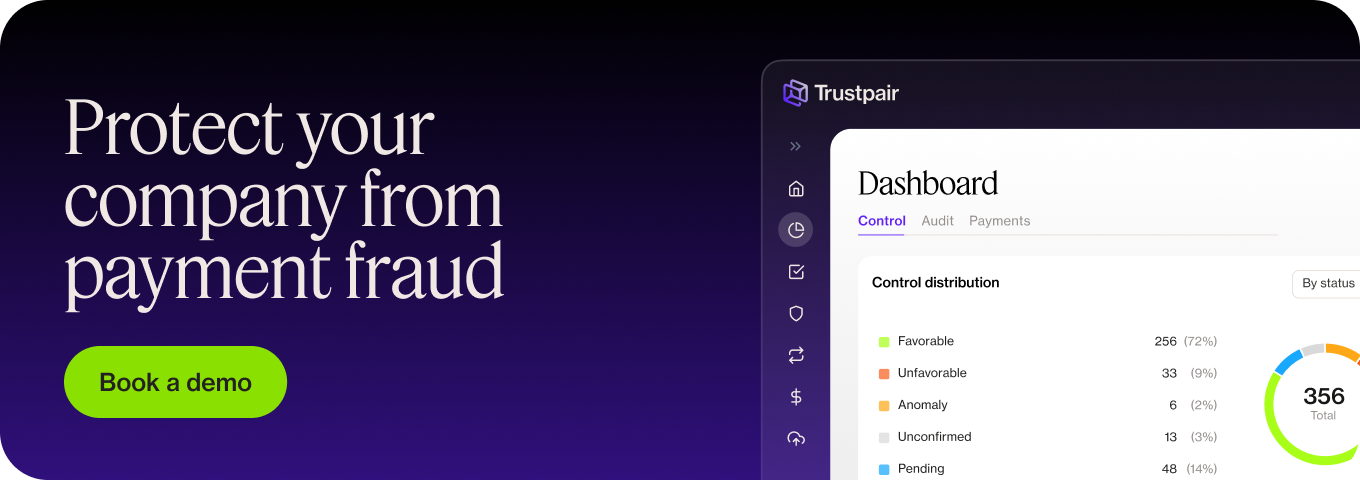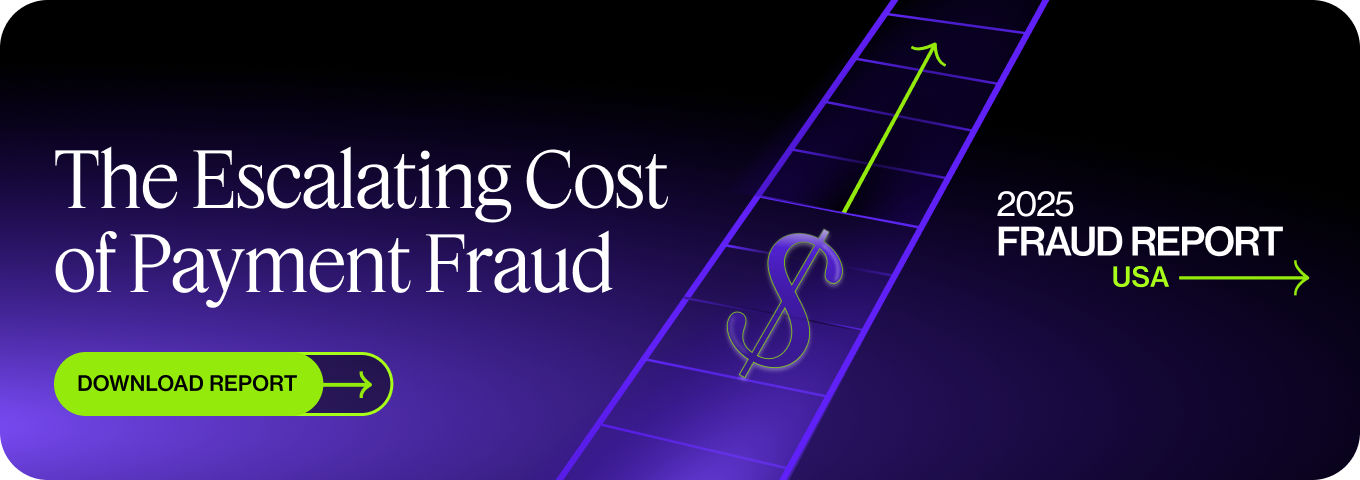Fraud deterrence is the key to maintaining financial integrity within your business. Organizations need strong fraud deterrence measures to prevent, detect, mitigate, and respond to fraud attempts. For example, in 2022, 60% of treasury professionals planned to increase their use of ACH as a payment method, machine learning, and APIs in order to deter check fraudsters.
Trustpair helps companies to successfully deter scammers by continuously auditing suppliers and blocking suspicious payments. Contact an expert to learn more!
Understanding fraud deterrence and its impact on Businesses
When organizations think about fraud deterrence, it’s typically after a fraud event occurs. Anti-fraud tools are sometimes treated like an expendable cost because their impact isn’t always immediate, or obvious.
At Trustpair, we want to flip the switch on the way that companies think about fraud deterrence because teams lost 30% more to fraud in 2022 than the year before. That means that current fraud deterrence measures aren’t working properly, and companies need a more bulletproof strategy to protect their finances.
What is fraud deterrence?
Fraud deterrence refers to the idea that fraud isn’t random. In fact, fraud is detected based on the three pillars of the fraud triangle:
- Pressure: for example, if employees know that the sales are going down and fear job losses, they could feel the pressure to falsify accounts in order for job security
- Opportunity: criminals believe that they can commit fraud without being caught and can easily spot the vulnerabilities in the business
- Justification: committing fraud is rationalized to somehow be not against their morals – “it’s only going to be a one-time thing”
When each of these elements of the fraud triangle comes together, the likelihood of fraud is high.
With these three motivations for fraudsters to perpetrate their crimes in mind, fraud deterrence is the strategy or measures in place to block at least one of the pillars. The fraud deterrence action removes either the pressure, opportunity, or justification and thus reduces the chance of fraud.
Consequences of fraud in businesses
The consequences of fraud are very well-documented. The financial consequences are often the most immediate – with huge monetary losses across the board. For example, the 2015 Target data breach and subsequent identity theft led to $18.5 million in legal damages, and the Enron scandal ended in bankruptcy.
But most of the time, your finances can be built back up. It’s the reputational damage that can have the biggest effect after fraud occurs. Customers no longer trust your company to keep their personal information safe and often switch over to your competitors. It’s this domino effect that can often be the final nail in the coffin for businesses and can strain your relationships with suppliers, too.
To learn more, download our latest fraud report.
Establishing a comprehensive fraud deterrence framework
When planning your defense strategies against online fraud, fraud deterrence should be the first stage of the process. If your people can develop a way to ward off fraudsters from the beginning, you’ll have fewer threats of fraud and a generally better-protected company.
These are the three considerations for establishing a comprehensive financial fraud deterrence framework:
- Developing a written fraud prevention policy
- Implementing strong internal detective controls
- Conducting regular risk assessments
Developing a written fraud prevention policy
A written fraud prevention policy details exactly how your company will deal with preventing fraud and responding to fraud attempts. It details the steps that your staff should take – and makes it clear that every member of the team is responsible for preventing fraud.
Implementing strong internal controls
Strong internal controls work well in fraud deterrence because, when followed, they significantly reduce the area of vulnerabilities in a business. This wards off potential fraudsters, because it reduces the second pillar of the fraud triangle: opportunity.
One example of good internal control is the segregation of duties. Here, finance duties like payments are split between two different approvers to prevent the likelihood of internal fraud. The four eyes principle is a type of duty segregation and a form of control that protects your payments specifically from internal fraud.
Conducting regular risk assessments
Risk assessments help to identify the risk factors that might be promoting or attracting fraudsters to your business. It could be worthwhile to split this into the three pillars of the fraud triangle, in order to really get into the shoes of someone looking to take advantage of your business.
Risk assessments should encompass:
- third party risks: like partnering with reliable vendors whose shipments will arrive on time, every time
- internal risks: such as employing trustworthy people and removing pressure on them to reduce the risk of internal fraud, such as expense fraud
- operational risks: for example, the security of your IT system against cybersecurity attacks
Promoting a culture of fraud deterrence, awareness, and ethical behavior
At the end of the day, fraud detection and prevention start from within your business. Without a strong culture and employee advocacy, fraudsters could end up falling through the cracks. So, in order to promote a healthy anti-fraud culture at your workplace, here are some key considerations:
- Employee education and training
- Encouraging whistleblowing and reporting
- Fostering ethical conduct
Employee education and training
Employees can be some of your best protection against fraudsters. Especially when they have been equipped with the right training and have a good awareness of the red flags.
For example, the Kentucky State Treasury team was able to prevent losses of around $5.3 million in 2018 due to employee fraud awareness training. Upon a request to change payment details for a wire transfer, the employee raised their concern to a supervisor because they were suspicious about the request. Thankfully, the team didn’t validate the request and found that it was a fraud attempt – delivered through a business email compromise scheme.
Encouraging whistleblowing and reporting
Whistleblowing is often frowned upon in workplace cultures – but flipping this mindset could be the key to protecting your business against internal fraud, and other types of fraud.
Importantly, some regulations like SOX Law actually require publicly traded companies to facilitate whistleblowing reports. This requirement to protect whistleblowers encourages employees to confidently speak out against illegal activities, protecting the interests of the company and the public.
Fostering ethical conduct
Of course, an overall culture of ethical conduct is required to truly deter fraudsters from the inside out. This focuses on the third pillar of justification- it’s harder for fraudsters to rationalize their actions and commit money laundering against truly ethical companies.
This means creating standards from the top, and ensuring that senior executives are setting a good example. If junior employees join the company and see that more senior figures are abusing the expense system, for example, they are likely to follow suit and commit internal fraud.
Using automation for Fraud Deterrence
Automation is one of the easiest ways to deter fraudsters and protect your business. That’s because it can give your business 360 visibility, gaining control over vulnerabilities. In particular, automation tools can detect suspicious payment attempts and highlight behavior anomalies.
Trustpair is an automated fraud deterrence measure, that empowers organizations to verify and validate their third parties. What’s more, our tool integrates within the existing stack to increase security, and efficiency and bolster the strength of your fraud detection measures.
Demo Trustpair to experience the ultimate fraud deterrence tool.
To conclude
Fraud deterrence is about preventing scams and theft in your business. Ward off fraud (like phishing attempts) through proper authentication and access to your systems. Plus, putting the right detecting methods in place, such as automated platforms like Trustpair, and encouraging whistleblowing should help your business strengthen its defenses against fraud.






